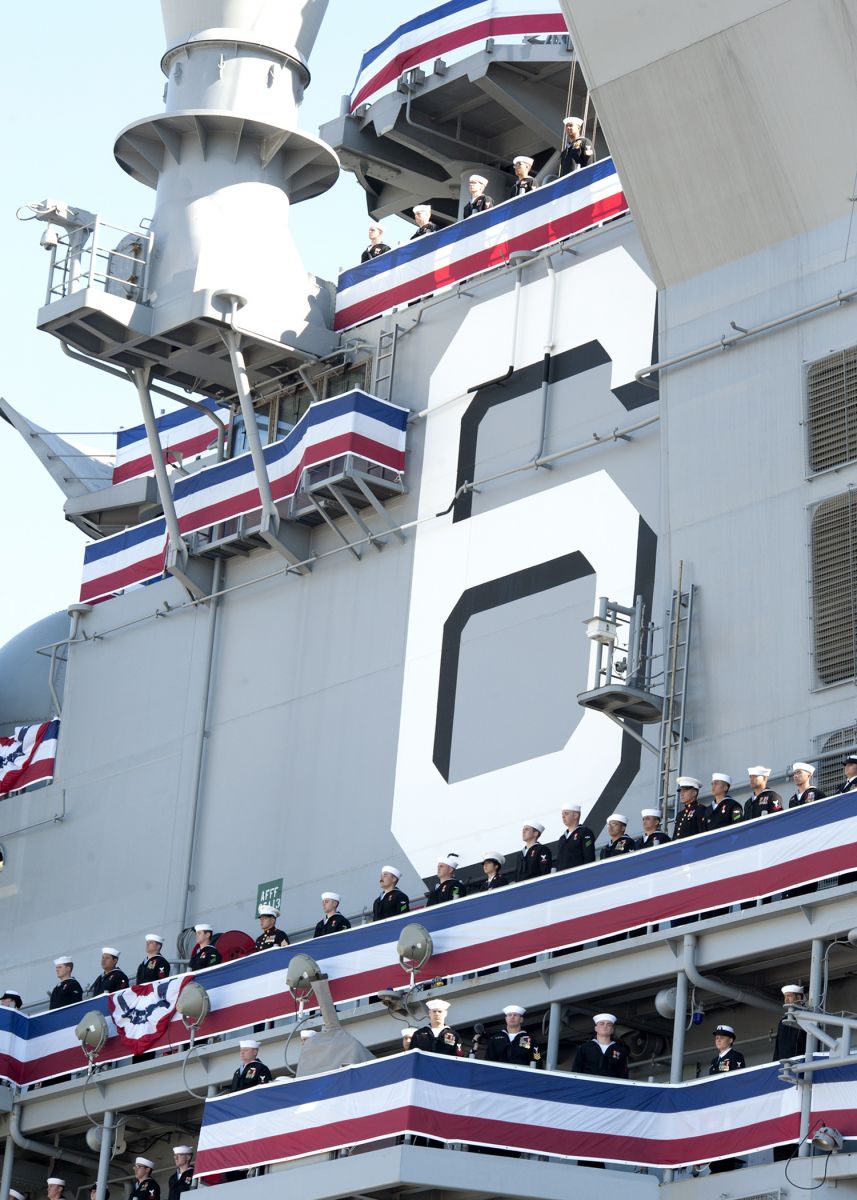USS America Joins the Fleet
USS America (LHA 6), the Navy's newest and most technologically advanced amphibious assault ship, was commissioned during a formal ceremony at Pier 30/32 during San Francisco Fleet Week, Oct. 11.
More than 8,000 friends, family members and invited guests gathered in front of the ship to witness its introduction to the fleet.
During the ceremony, Adm. Harry B. Harris, commander, U.S. Pacific Fleet, commended the crew for their performance during acceptance trials and sailing around South America. He said because conflict and crisis can arise at any time, warships like America will be needed as the nation conducts its strategic rebalance to the Pacific.
At the conclusion of his remarks, Harris introduced Secretary of the Navy the Honorable Ray Mabus, who spoke of the importance of having a ship named America join the fleet.
"This ship, forged in a shipyard in my home state of Mississippi, with components and systems and parts manufactured all across this great country, is a symbol of the long and historic links between the citizens of this country and our Navy and Marine Corps who defend them," Mabus said. "Having a ship named the America, sailing the world's oceans, defending freedom and peace and helping those in need, as we have for more than two centuries, is crucial to America and to our Navy and Marine Corps."
Following Mabus' remarks, in a time-honored Navy tradition, Mrs. Lynne Pace, ship sponsor and wife of retired U.S. Marine Corps Gen. Peter Pace, former chairman of the Joint Chiefs of Staff, gave the order, "Man our ship and bring her to life!"
The crew responded by saying "Aye, aye, ma'am" and began running toward the brow to man the ship as the Navy Band Southwest played "Anchors Aweigh." Crew members took their places, side-by-side, manning the rails as the ship's systems came online. Radars, weapon systems, and other parts of the ship began moving to symbolize the ship "coming to life."
After the crew manned the rails, Capt. Robert A. Hall Jr., commanding officer of USS America, stepped forward to deliver his remarks.
"To the crew of USS America, as plankowners we've been granted awesome responsibility and great privilege to send America out to sea on the right course," Hall said. "You've worked extremely hard thus far to get her to this point, performing extraordinarily on our maiden voyage around South America. I thank you for that incredible effort, and I'll tell you, it's just the beginning."
Hall said the ship is named after the greatest country on Earth and spoke of the legacy America will carry 
America is the first ship of its class and the fourth ship named "America." The first America was originally a racing schooner launched in 1851 and served in the Navy until 1873 before returning to civilian life. In 1921, she was presented to the Navy for preservation as a relic and remained at the U.S. Naval Academy until being scrapped in 1945. The second America transported troops during World War I. The third ship to bear the name was a Kitty-Hawk class aircraft carrier, CV 66, which supported operations from the Vietnam War through Operation Desert Storm.

that matters most
Get the latest maritime news delivered to your inbox daily.
America weighs 44,971-tons, is 844 feet in length and has an overall beam of 106 feet. It's equipped with a fuel-efficient, hybrid electric propulsion system, the same built for USS Makin Island (LHD 8), which is an energy initiative designed to give the ship the benefit of increased range, endurance, and time on station, enhancing its combat capability. It also provides greater flexibility in scheduling refueling and reduces maintenance costs.
The ship is optimized for aviation and will be capable of supporting current and future aircraft, such as the tilt-rotor MV-22 Osprey and F-35B Joint Strike Fighter. It was designed with additional aviation spaces and provides increased aviation capacity, including an enlarged hangar deck, the realignment and expansion of aviation maintenance facilities which provide a significant increase in available stowage for parts and support equipment, and increased aviation fuel capacity.
